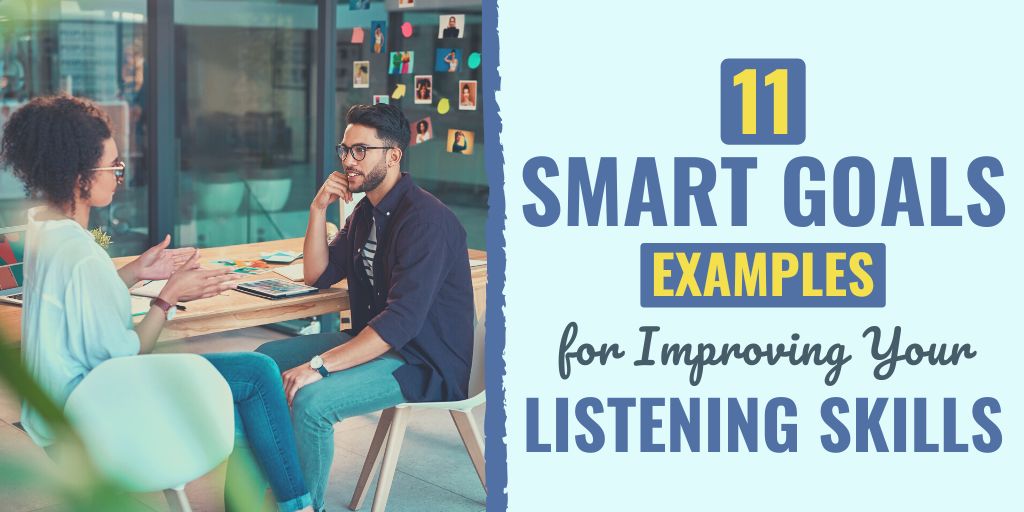There might be affiliate links on this page, which means we get a small commission of anything you buy. As an Amazon Associate we earn from qualifying purchases. Please do your own research before making any online purchase.
When we talk to someone, it’s easy to prepare ourselves to respond immediately tr other person’s words way before they have completed their statement. We listen, but only to respond and hardly listen to understand.
That’s why it’s important to develop the habit of active listening.
Active listening means giving the speaker undivided attention and feedback to show that you are listening to what they are saying. It is a skill that requires planning, practice, and patience to master.
One way you can master this skill is to set SMART goals that help you apply active listening as a habit in your daily life. This will make you a better communicator and help you win more friends.
So in this article, we’ll talk about the importance of setting SMART goals related to active listening and then we’ll provide eleven SMART goals examples you can use to improve your listening skills.
Let’s begin with a simple definition.
What are SMART Goals?
We all have objectives that we want to achieve in our lives. Some of us make an active effort to accomplish these objectives, while others put them “some day.”
Any objective you make no effort to complete is merely a dream or a wish. Any wish or dream that you make an active effort to achieve will become an objective.
Do you know that only twenty percent of the global population ever sets clearly defined goals? Out of the twenty percent, only forty percent accomplish their goals. If we do the math, we conclude that only eight out of every hundred people can achieve what they desire.
One common reason for not accomplishing what we desire is that we are unsure how and where to start. It is essential to have clearly defined objectives and a plan on how to achieve them.
SMART goals help you specify and define what you want to achieve and plan to achieve them. With a narrowed down and focused vision of your target, getting there becomes significantly easier, increasing your chances of accomplishment.
Say if you were to set a goal, “I want to be a better listener,” for yourself. This goal is broad and will probably end up on the “things I plan to do one day” list.
But if you were to set up SMART goals for improving your listening skills, you can be well on your journey to sharpening your listening skill today.
SMART is an acronym and it states that a goal must have the following five characteristics:
It is important to follow the right method to set SMART goals. You can use the Ultimate Guide to SMART Goals for steps that you need to take to make setting and achieving goals easier.
Why SMART Goals are Important for Listening Skills
Many people often set themselves up for failure because they set goals that are unrealistic, too vague, or even irrelevant to them.
A goal such as “I want to be the best listener” is vague and has no direction. It will make no sense to you in the long run, and you will probably give up on it before you even begin to work on it.
Setting SMART goals for listening skills is crucial because it helps to define your objectives and ideas clearly. Since they provide a clear vision of the goal that you are trying to achieve, they help you remain focused on the goal.
Everyone has multiple tasks to complete regularly. It is possible to lose track of your listening goals in the clutter you have to handle every day. SMART goals can be broken down into small tasks that you can accomplish every day to inch closer to your bigger objective.
For example, in your attempt to improve your listening skills, you set a SMART goal to improve eye contact. You can keep this objective in mind and track your daily progress of how well you are doing. It is much easier than tracking how much of a better listener you have become over the day.
Another reason for setting SMART goals for listening skills is getting the opportunity to celebrate your mini-achievements.
For example, you set a goal to make proper eye contact with ten people in a day. When you achieve this goal, you will feel a sense of accomplishment and will be motivated to put in extra effort to achieve more.
SMART goals allow you to separate your objectives from wishful thinking. The goals set are more attainable and often have room for error.
For instance, this goal is achievable when you set a goal of improving your listening skills by making proper eye contact with ten people every day for the next ten days. It is separated from a wish to become excellent at eye contact by tomorrow, which would not be attainable, and you will eventually give up on it.

SMART goals also make sure that you have a reason for achieving the goal, which turns out to be your burning desire. You are more likely to give up on your goal without a valid reason.
For instance, you want to improve eye contact because you want to improve your listening skills. A solid reason will keep you going in the direction of your objective.
Lastly, SMART goals completely eliminate the “things I will do someday” list. They set a timeline and a deadline for you to achieve your goal.
For example, improve eye contact by making proper eye contact with ten people for ten days. This has a deadline of ten days. It allows you to keep track of the time you are taking to accomplish your goal.
Okay, now that you know why setting SMART goals are important, let’s dive into the eleven examples.
11 SMART Goals Examples for Active Listening
1. Make Eye Contact
“I want to improve my eye contact with people speaking to me. I will do this by consciously making eye contact with six people every day for one week. I will make eye contact for ten seconds, break for a few seconds, and then make eye contact again.”
S: Improve eye contact with people who are speaking to me
M: I will make eye contact in ten-second intervals with at least six people every day
A: Consciously putting in the effort makes this goal attainable
R: I want to improve my listening skills, and eye contact is a crucial element of active listening
T: I have set a deadline of one week for this goal to see how I am making progress.
2. Provide Non-Verbal Feedback
“I want to provide non-verbal feedback to the speaker to let them know I am intrigued by what they are saying.
I will consciously turn my body towards the speaker and nod my head to indicate to the speaker that I am actively listening. I will carry on this practice for one week and try to talk to more than five people every day.”
S: Make it a habit to provide non-verbal feedback to the speaker
M: I will consciously practice turning towards the speaker and nodding my head for one week, with at least five people every day.
A: Consciously putting in the effort makes this goal attainable
R: I want to improve my listening skills, and non-verbal feedback is an important element of active listening
T: I have set a deadline of one week for this goal to see how I am making progress.
3. Paraphrase What People Say
“Providing verbal feedback is one of the best ways to let a speaker know I am listening to them. I will make it a habit to acknowledge what the speaker is saying by paraphrasing what they say.
I will start by paraphrasing small statements for ten days and move to bigger statements after that. I will make sure that I give strong verbal feedback to at least three speakers every day.”
S: Make it a habit to provide verbal feedback to the speaker
M: I will practice giving verbal feedback to at least three speakers every dayfor ten days
A: I am planning to start with small statements and move to bigger statements after some practice
R: I want to improve my listening skills, and verbal feedback is an important element of active listening
T: I have set a deadline of ten for this goal to see how I am making progress. I will then increase the challenge
4. Use Non-Judgmental Statements
“I want to be open-minded and stop being judgmental about what the speaker is saying. If I disagree with the speaker’s viewpoint, I will politely let them know that I disagree and not criticize or attempt to enforce my viewpoint on them. I will consciously practice this activity for the next thirty days with anyone I disagree with.”
S: I want to be open-minded and stop being judgmental about what the speaker is saying.
M: Ican count the number of times I politely told a speaker that I disagree
A: Consciously putting in the effort makes this goal attainable
R: I want to improve my listening skills, and having an open and non-judgmental mind is an important element of active listening
T: I have set a deadline of thirty days for this goal to allow myself to overcome old habits
5. Ask Clarifying Questions
“I am an extreme introvert and often do not speak out. I want to let the speaker know when I don’t understand something.
I will make a conscious effort to ask questions like “Can you please explain this further?” and “I did not get what you said about …. , can you please clarify?” whenever I don’t understand what was said. I will consciously hold onto this practice for sixty days.”
S: I want to let the speaker know when I don’t understand something
M: I can count the number of times I told a speaker when I did not understand something
A: Consciously putting in the effort makes this goal attainable
R: I want to improve my listening skills, and I cannot be a good listener if I do not fully understand what the speaker is saying
T: I have set a deadline of thirty days for this goal to allow myself to overcome old habits
6. Practice Patience During Conversations
“I want to allow the speaker to complete what they are saying before I begin to share my thoughts on the subject being discussed. I will consciously control the urge to cut the speaker off at all times. I will hold on to this practice for the next thirty days to see how I am progressing.”
S: I want to allow the speaker to complete what they are saying before I begin to share my thoughts
M: I can count the number of times I controlled myself from cutting the speaker off
A: Consciously putting in the effort makes this goal attainable
R: I want to improve my listening skills, and I cannot be a good listener if I cut off other people in the middle of their statements
T: I have set a deadline of thirty days for this goal to allow myself to develop this habit
7. Allow Other People to Speak First
“If the other person and I start talking simultaneously, I will give way to the other person and allow them to complete what they are saying before I begin to share my thoughts. I will consciously stop myself in such scenarios for the next thirty days.”
S: I will give way to the other person and allow them to complete what they are saying
M: I can count the number of times I gave the other person the go-ahead in such a situation
A: Consciously putting in the effort makes this goal attainable
R: I want to improve my listening skills, and I cannot be a good listener if I try to prove my point without listening to the other person’s perspective
T: I have set a deadline of thirty days for this goal to allow myself to develop this habit

8. Learn to Read Body Language
“Part of being a good listener is reading what is not said. With this in mind, I will seek to learn how to read body language within the coming three months. I will watch videos and read books in order to learn the basics.
I will test my knowledge by using what I read from the other person when I ask questions and give feedback, making sure I read things correctly.”
S: You mention that you will watch videos and read books with the purpose of learning body language. You will then give feedback to speakers based on this knowledge.
M: You can keep track of what books and videos you watch and the accuracy of your “readings” will measure this goal.
A: It is an easy matter to add time to your schedule to watch videos and read books.
R: Learning to read between the lines is a very important part of listening completely. By reading and watching videos, you have a good means of learning to read body language.
T: You allow yourself three months to complete this goal, making this a time-bound goal.
9. Listen to Podcasts and Audio Books
“By listening to podcasts and non-fiction books, I need to be able to understand without the benefit of body language. Therefore, I need to listen more closely.
Starting next week, I will listen to one podcast and one book on tape each week. I will take notes and ask myself questions afterward in order to gauge my understanding of the key points. I will do this for three months.”
S: You mention what you will listen to and what you will do while listening and afterward. You also mention when you will start and for how long you will continue.
M: You can keep a notebook listing the podcasts and books you listen to as well as the information you gain from them.
A: As long as you make time in your schedule, this is a completely achievable goal.
R: Being able to maintain focus while only listening is difficult. Mastering this activity will allow you to be more focused when having in-person conversations.
T: You mention starting next week and listening to one of each weekly. You also mention doing this for three months. All of these make this a time-bound goal.
10. Remain Calm When the Speaker is Upset
“When someone is upset, I tend to start defending myself in my mind before they have finished talking, sometimes missing key information. Starting with the very next interaction of this type, I will actively stop myself and take a deep breath to remain calm until the person has finished speaking.
I will continue doing this for the coming three months, allowing time for it to become a habit.”
S: You mention what you will do, when you will do it, and why you are doing this. All of these make this a specific goal.
M: You can measure this goal by making notations after the fact about the conversation and whether you remained calm.
A: This may take practice, depending upon your personality, but it is an attainable goal as you are controlling only your reactions.
R: When we are emotional and on the defensive, we do not listen fully to what is being said. Therefore, being able to remain calm is essential to listening fully.
T: You give yourself three months to make this a habit. This makes it a time-bound goal.
11. Take Notes if Possible
“In any conversation where it is polite to do so, I will start taking notes on what is being said. This will allow me to ask better questions and give me a way to review the conversation so I get all the details correct. This will start with the very next conversation and will continue indefinitely.”
S: Taking notes is very specific. You also mention why you are doing it and mention reviewing. You finally mention this will start with the next conversation.
M: Your notes will be a measure of whether or not you are completing your goal. The number of misunderstandings will also show progress as they lessen.
A: This goal is attainable. You only need to be prepared for taking notes at all times.
R: By taking notes, you don't rely simply on your memory or your ability to retain all details. This makes it relevant to be a good listener.
T: Stating that this will start with the very next conversation makes this time-bound.
Final Thoughts on SMART Goals for Listening Skills
Setting SMART goals for listening skills is important because it helps you identify the specific actions you need to develop in order to better appreciate what people are tell you.
So if you’d like to become an active listener, I suggest that you review this list of eleven goals and pick one that best fits your personal situation. From there, we suggest that you follow this step-by-step process on how to set and achieve SMART goals.
Also, if you’d like to see another related article, then here are some examples of SMART communication goals which will help you become a better communicator.
And if you want more SMART goal ideas and examples, be sure to check out these blog posts:
- 15 SMART Goals Examples for Your Nursing Career
- 7 SMART Goals Examples for Churches or a Ministry
- 6 SMART Goals Examples for Social Workers
Finally, if you want to take your goal-setting efforts to the next level, check out this FREE printable worksheet and a step-by-step process that will help you set effective SMART goals.


